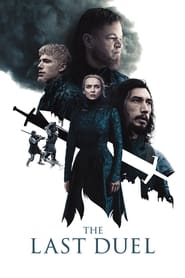Just as the highly-recognisable Harvey Keitel could not disappear into his role in Ridley Scott's own The Duellists (1977), so does Adam Driver fail to retreat into his part in The Last Duel. Yet apart from Keitel's Brooklyn-by-way-of-Bordeaux accent, it didn't seem to matter in Scott's earlier film. Perhaps because it is easier to imagine Keitel's paratextual identities (Mean Streets, Taxi Driver, etc.) as being more or less the same person? The question is, can we take Driver seriously as a medieval squire after Girls (2012–2017) and Frances Ha (2012)? I could readily believe Matt Damon after the almost-identically headstrong LaBoeuf in True Grit (2010). Interestingly, blond-haired Ben Affleck 'works' chiefly because he doesn't look like Affleck at all, but a kind of Valoisian Klaus Kinski.
The production design looks pretty solid and is even said to be authentic by those who know and carp about period-correct armour. However, after eight seasons of Game of Thrones, it's no longer a noteworthy aspect of medieval period pieces, and a concomitantly large budget for steel plate and wax candles must surely be priced into any production like this. Indeed, The Last Duel has something of GoT's subdued, dark and digital aesthetic, whereas The Duellists often had an untamed (albeit Barry Lyndon-inflected), sense of filming on 35mm.
But of course this film is actually in conversation with two films — Ridley Scott's own The Duellists (1977) and Akira Kurosawa's Rashomon (1950). Again, the comparison is not entirely favourable to Scott. When placed up against the epistemological drama of Rashomon, The Last Duel does not fundamentally destabilise our whole notion of truth and settles for a more-or-less satisfying allegory of #metoo.
Still, The Last Duel's most interesting contribution is that it does not reduce itself to simply a he-said-she-said story, despite the legalities and anachronistic publicity rhetoric of "deny, deny, deny." Rather, given that the viewer is privy to what Driver's Jacques Le Gris believes happened in that deserted castle (and we must assume that that is the best construction on events we are likely to get), we are perfectly capable of drawing an opinion. Le Gris' account differs from Marguerite's to be sure, but it is quite evidently a rape in both cases. Thus the film asks us to draw the conclusion Le Gris genuinely believes he has done nothing wrong and committed no crime, and that his verbal confession to the priest is not simply a self-serving lie. (Incidentally, I wonder if they tried a more flattering presentation of Le Gris' idea of truth in the editing room.)
The film's final choice is ultimately the more cynical reading of society today and, assuming the film is to be read as an allegory, for society now. Yet this otherwise rather heavy-handed film does not insist that viewers take account of this angle, so it might not be an intended interpretation. Similarly, did Sir Jean de Carrouges' mother have a manipulative hand in Le Gris arriving at an empty house? It is certainly possible given that she has probably never before been alone in her adult life. But again, the graceless portrayal of some other aspects of the film does not make one enthusiastic about this. (Ditto my contention that King permits the duel in part to avoid having to make any judgment at all... in addition to wanting to see a fight.) This all puts me at odds with other reviewers of the film, such as Glenn Kenny of RogerEbert.com, who, assuming they are referring to the rape, believes that the characters espouse "cardboard conceptions of concepts such as duty, loyalty, and fealty to God as the pretexts for their petty, criminal actions." They might be cardboard to us, but it's perhaps a more damning inditement of society if they believe they haven't done anything anything to create a pretext for.
The Last Duel may superficially mimic Rashomon, but [in] moments it arrives at a decidedly different conclusion from Akira Kurosawa’s classic. Truth isn’t always ambiguous; sometimes it’s just suppressed, ignored and written out of history. All of which runs the risk of making this movie sound obvious in its indictment of the arrogance, stupidity and awfulness of men in every century. Tell us something we don’t know! But if The Last Duel hits some familiar notes, it hits them, more often than not, with both unfeigned anger and an invigoratingly dark sense of humor. That subversiveness extends to the (anti)climactic duel itself, which Scott stages with all the bloody virtuosity you’d expect, but which nonetheless rings curiously, almost deliberately hollow. It hardly matters which man wins, the movie seems to be saying, in a world where women are destined to lose.
— Justin Chang (The Los Angeles Times)

